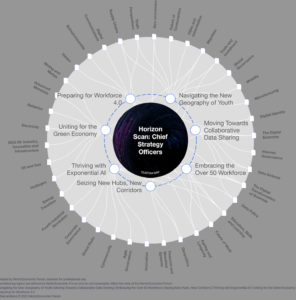Foresight, a set of approaches that help explore, imagine and anticipate the future in an open but structured way, can help identify and explore challenges and opportunities emerging from multiple signals and drivers of change shaping the future. It is also critical to inform decisions and act as a trigger for developing strategic options in a context full of unknowns. Indeed, a peer reviewed academic study found that firms that practice foresight had a 33% higher profitability and a 200% higher market capitalization growth when compared with the sample average.
Yet research also shows that 75% of organizations are not prepared for the pace of change in and around their industry. Many organizations wind up asking themselves why they backed trends that were not sustainable and did not anticipate events like the COVID pandemic and the war in Ukraine.
The signals of disruption may be there but for humans to pay attention to, and connect the dots between possible interactions and repercussions across hundreds of different topic areas can be overwhelming and easily lead to neglect or denial. Conducting this kind of systemic horizon scanning is next to impossible without the filtering ability, throughput, and analytical powers of AI, says Stephan Mergenthaler, the World Economic Forum’s head of strategic intelligence and a member of the Forum’s executive committee. That’s why the Forum is now applying advanced technologies to its strategic intelligence arm, which was first established in 2017.
The aim is to help corporates, who are increasingly feeling like they are the mercy of developments outside of their influence, “to not just understand and react but also have more agency to shape emerging trends,” says Olivier Woeffray, the Forum’s Practice Lead, Strategic Intelligence.
The Forum’s Strategic Intelligence arm aggregates high-quality content on 250+ global issues from hundreds of hand-picked think tanks, universities, research institutions and independent publishers (including The Innovator.) “This gives us a tremendous data set from which we can extrapolate trends that are shaping the world around us,” says Mergenthaler.
Transformational ideas often come from the intersections between two completely different fields or domains — such as 3D printing and biology combining to print human tissue. Underpinning knowledge with a platform which understands connections between topics and the interests and expertise of people and organizations is essential to identifying opportunities for first-mover strategic advantage.
Although still not perfect the Forum’s recent advancements in harnessing machine learning and natural language-understanding technology mean that it is able to better understand these trends at depth, whether they present opportunity or risk and how disruptive they could be, says Mergenthaler.
So far, the Forum says it is at around 70% accuracy within one standard deviation of the mean on forecasts up to one month in advance. As it adds more signals into the mix, it expects to not only improve the accuracy but also the foresight time frame, says Mergenthaler. Going forward it hopes to be able to use Generative AI to create even more accessible narrative summaries for those signals, he says.
“Corporate strategy cycles are getting shorter, and organizations need to be tweaking the strategy constantly, not just once a year,” he says. “In the past we could support them through periodic gatherings and cross-industry strategic conversations. We can now offer help whenever they need additional input and any member of their company – whether they be a top executive or a functional manager – can access all these signals.”
An example of how the Forum marries its unprecedented access to top level executives across industries with the benefits of machine learning and natural language processing is the way it handled a March workshop that brought together 250 Chief Strategy Officers from more than 20 industries, says Mergenthaler. The strategy officers were asked to conduct a cross-industry horizon scan to explore, prioritize and share perspectives on emerging signals that could potentially break through as inflection points over the next three to five years.
Among the five areas that surfaced was collaborative data sharing. (click here to access the map that was generated from the workshop)

For several decades, businesses across industries have relied on proprietary data to gain a competitive edge. But strategy officers participating in the workshop argued that there is a much greater value in sharing data.
Most companies are yet to realize the potential of shared data but research shows that data and analytics leaders who share data externally generate three times more measurable economic benefits than those who do not and that companies that embrace shared data stand to benefit from increased collaboration, improved efficiency, and the ability to tap into a broader pool of expertise.
The Forum took that insight back into its massive database of expert analysis, making it available at scale. As a result of the combined findings, The Forum has also elevated the topic of collaborative data in its industry and cross industry agendas, says Mergenthaler.
“We are using the Forum’s network – which is unique in terms of its breath and global perspective – to deliver strategic intelligence at a much greater scale,” he says. “Our aim is to connect that with structured methodology – such as combining the views of strategy officers in a workshop – with expert analysis in our database in real time to solidify both the conclusions and opportunities. We want to not just give a glimpse of the future but understanding of how industry systems and tech systems connect and how changes may translate into the strategic environment of industries.”
The Forum’s Strategic Intelligence has a million registered users. The content is publicly accessible. Forum Members can additionally access analytical features, such as trend summaries and briefings.
“Governments and companies are looking for new ways of practicing foresight,” says Mergenthaler. “What we want to do with this is to democratize access to best-in-class insights and thinking to anyone in any organization out there, which is in line with the Forum’s ambition to have a positive impact on the world.”
This article is content that would normally only be available to subscribers. Sign up for a four-week free trial to see what you have been missing.
To reach more of The Innovator’s Innovation Strategy articles click here.





